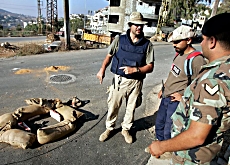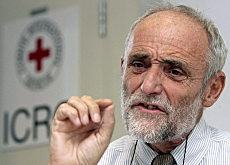Explosives hamper return of Lebanese civilians

Aid organisations have warned of the dangers posed by unexploded ordinance in southern Lebanon as refugees continue returning home.
The Swiss branch of the non-governmental group, Handicap International, and the foreign ministry’s aid agency have sent experts to assess the situation.
“We have dispatched several de-mining specialists to the region,” Paul Vermeulen, director of the Geneva-based group said on Thursday.
He added that United Nations experts had identified about ten sites where the Israeli air force used cluster bombs. About 14 per cent of this ordinance has not exploded, killing or injuring at least 16 people, according to Handicap International.
The Swiss foreign ministry’s Agency for Development and Cooperation (SDC) joined in the risk awareness campaign.
The SDC said it had sent a Beirut-based doctor to southern Lebanon to take part in the World Health Organization’s relief operation. Another expert is cooperating with the UN environment agency to clean up an oil slick caused by the bombing of a coastal power plant south of Beirut.
Shelter
Toni Frisch of the Swiss Humanitarian Aid Unit (SHA) said the Lebanese authorities were interested in a “Cash-for-Shelter” programme for families who provide a temporary home for displaced people.
An estimated one million people fled their homes after Israel’s armed forces launched their five-week offensive against the Iranian-backed Hezbollah militias in July.
Frisch said medical services in southern Lebanon were still insufficient because many hospitals were forced to close down during the military conflict.
The children’s charity, Terre des Hommes, and the Protestant church charity support rehabilitation programmes for victims of the conflict and sent two experts to the Lebanese port city of Sidon.
For its part, the Swiss Red Cross announced it had increased its financial contribution to the International Committee of the Red Cross (ICRC) and the Lebanese Red Cross to SFr800,000 ($652,000).
The funds are to go towards aid operations in Lebanon as well as in the occupied West Bank and the Gaza Strip, according to a Red Cross spokesman.
Meanwhile the Israeli army has eased its air blockade on the Lebanese capital, Beirut, and stepped up its withdrawal from southern Lebanon agreed under a ceasefire agreement with Hezbollah.
Instead a total of up to 30,000 Lebanese troops and UN forces will be stationed in the buffer zone near the Israeli border.
swissinfo with agencies
An estimated 14% of all bombs dropped by Israel’s armed forces have not exploded.
There are up to 10,000 pieces of live ammunition scattered in Lebanon, according to a UN demining agency.
At least 16 people have been killed or injured by such ordinance.
Switzerland has given the Swiss-run International Committee of the Red Cross (ICRC) SFr5.2 million ($4.3 million) for relief work in Lebanon.
The country has also sent 800 kilograms of medication and seven tons of supplies, along with a dozen humanitarian specialists.
The Swiss foreign ministry’s Agency for Development and Cooperation (SDC) has shifted much of its humanitarian aid effort to southern Lebanon to assist returning refugees.
The ICRC said it aims to supply at least 200,000 internally displaced people and vulnerable residents in Lebanon with food and other items by the end of the year.
It aims to deliver drinking water to one million people and support health structures used by 600,000 people.

In compliance with the JTI standards
More: SWI swissinfo.ch certified by the Journalism Trust Initiative










You can find an overview of ongoing debates with our journalists here . Please join us!
If you want to start a conversation about a topic raised in this article or want to report factual errors, email us at english@swissinfo.ch.